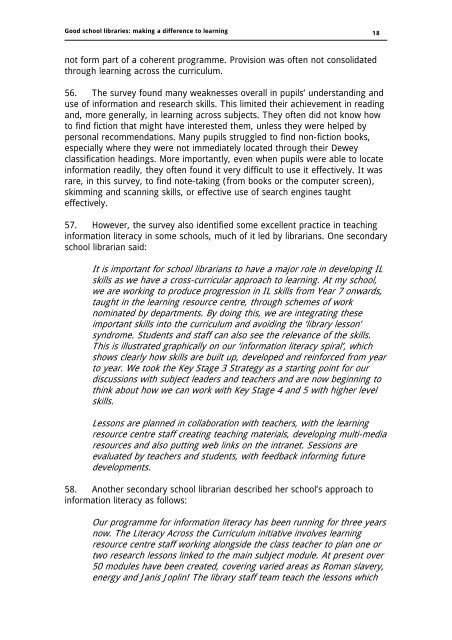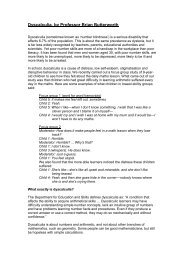Good school libraries: - Digital Education Resource Archive (DERA)
Good school libraries: - Digital Education Resource Archive (DERA)
Good school libraries: - Digital Education Resource Archive (DERA)
Create successful ePaper yourself
Turn your PDF publications into a flip-book with our unique Google optimized e-Paper software.
<strong>Good</strong> <strong>school</strong> <strong>libraries</strong>: making a difference to learning 18<br />
not form part of a coherent programme. Provision was often not consolidated<br />
through learning across the curriculum.<br />
56. The survey found many weaknesses overall in pupils’ understanding and<br />
use of information and research skills. This limited their achievement in reading<br />
and, more generally, in learning across subjects. They often did not know how<br />
to find fiction that might have interested them, unless they were helped by<br />
personal recommendations. Many pupils struggled to find non-fiction books,<br />
especially where they were not immediately located through their Dewey<br />
classification headings. More importantly, even when pupils were able to locate<br />
information readily, they often found it very difficult to use it effectively. It was<br />
rare, in this survey, to find note-taking (from books or the computer screen),<br />
skimming and scanning skills, or effective use of search engines taught<br />
effectively.<br />
57. However, the survey also identified some excellent practice in teaching<br />
information literacy in some <strong>school</strong>s, much of it led by librarians. One secondary<br />
<strong>school</strong> librarian said:<br />
It is important for <strong>school</strong> librarians to have a major role in developing IL<br />
skills as we have a cross-curricular approach to learning. At my <strong>school</strong>,<br />
we are working to produce progression in IL skills from Year 7 onwards,<br />
taught in the learning resource centre, through schemes of work<br />
nominated by departments. By doing this, we are integrating these<br />
important skills into the curriculum and avoiding the ‘library lesson’<br />
syndrome. Students and staff can also see the relevance of the skills.<br />
This is illustrated graphically on our ‘information literacy spiral’, which<br />
shows clearly how skills are built up, developed and reinforced from year<br />
to year. We took the Key Stage 3 Strategy as a starting point for our<br />
discussions with subject leaders and teachers and are now beginning to<br />
think about how we can work with Key Stage 4 and 5 with higher level<br />
skills.<br />
Lessons are planned in collaboration with teachers, with the learning<br />
resource centre staff creating teaching materials, developing multi-media<br />
resources and also putting web links on the intranet. Sessions are<br />
evaluated by teachers and students, with feedback informing future<br />
developments.<br />
58. Another secondary <strong>school</strong> librarian described her <strong>school</strong>’s approach to<br />
information literacy as follows:<br />
Our programme for information literacy has been running for three years<br />
now. The Literacy Across the Curriculum initiative involves learning<br />
resource centre staff working alongside the class teacher to plan one or<br />
two research lessons linked to the main subject module. At present over<br />
50 modules have been created, covering varied areas as Roman slavery,<br />
energy and Janis Joplin! The library staff team teach the lessons which



